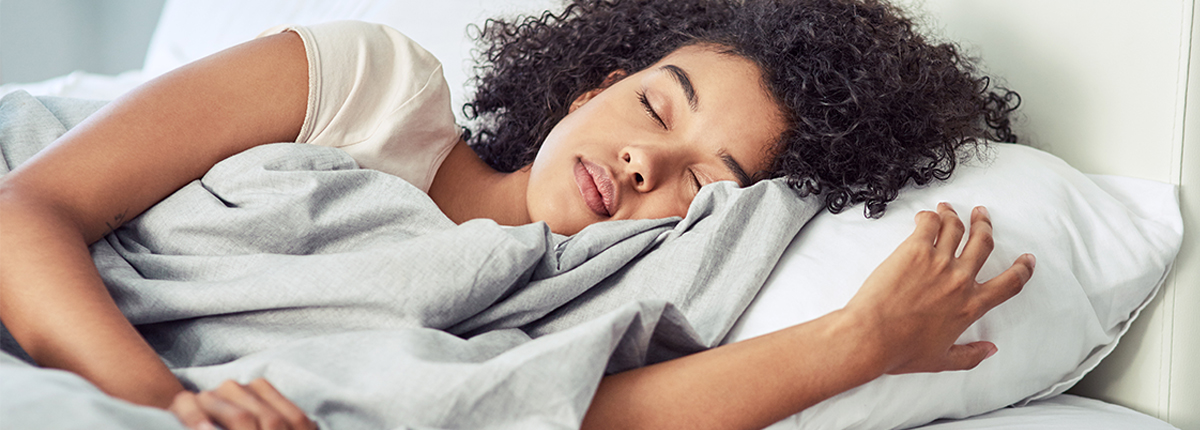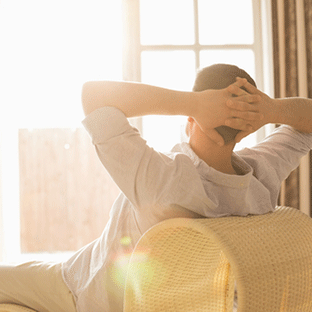Sleep hygiene - 11 tips to help you sleep better
Are you struggling to keep your eyes open? No matter who we are or what we do, we all need sleep to be able to function. In fact, sleeping well is the foundation of a healthy and productive life. Not getting enough sleep can have a serious impact on our health and wellbeing, both physically and mentally. But, our hectic schedules and lifestyles can get in the way of a good night’s sleep – leaving us drained and unable to fully engage with life. Luckily, good sleep hygiene can help.
Table of Contents
○ What are the signs of poor sleep hygiene?
○ What are the benefits of good sleep hygiene?
○ Sleep hygiene for children
○ Keep a consistent sleep schedule
○ Turn off electronic devices before you go to sleep
○ Exercise regularly
○ Limit your caffeine intake
○ Use your bed only for sleep
○ Limit napping — or avoid it if you can
○ Don’t eat late in the evening
○ Temperature for good sleep
○ Silence for good sleep
○ Bedding for good sleep
○ Air quality for good sleep
What is sleep hygiene?
Sleep hygiene is the name given to certain routines, behaviours, and practices that influence your ability to have a full night’s sleep.*1 With good sleep hygiene practices, you’ll be better equipped to enjoy a truly restful night’s sleep, and wake up refreshed to tackle the day.
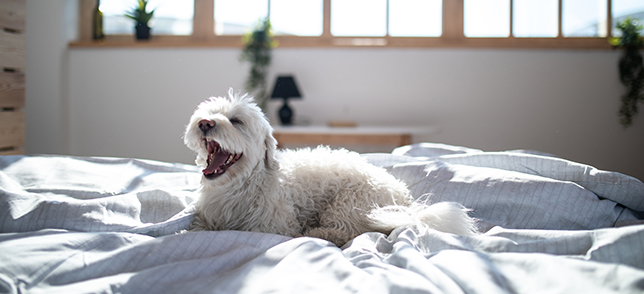
What are the signs of poor sleep hygiene?
- Difficulties falling asleep
- Easily interrupted sleep
- Sleepiness during the day
- Irritability
- Forgetfulness
- Difficulties concentrating
- Lack of consistent high-quality sleep or a shorter length of time sleeping
- Greater appetite
- Stress*2*3*4
By not getting a good night’s sleep, you’re more at risk of developing medical conditions such as high blood pressure, heart disease, type 2 diabetes, depression, and anxiety.*5
What are the benefits of good sleep hygiene?
- Contributes to a healthy body weight
- Improved memory
- Greater productivity
- Less stress and better overall mental wellbeing
- Improved immune system function
- Lower risk of heart disease, stroke, diabetes and cancer
- More energy*6*7
*2 https://www.sleepfoundation.org/sleep-hygiene
*3 https://www.sleepfoundation.org/sleep-hygiene/how-to-determine-poor-quality-sleep
*4 https://www.naturesbest.co.uk/pharmacy/sleep-health/what-is-poor-sleep-hygiene-symptoms-and-treatment/
*5 https://thesleepdoctor.com/sleep-hygiene/
*6 https://www.sleepscore.com/blog/the-importance-of-sleep-hygiene/
*7 https://www.naturesbest.co.uk/pharmacy/sleep-health/what-is-sleep-hygiene-5-benefits-of-good-sleep-hygiene/
Is sleep hygiene the same for everyone?
While there are general sleep hygiene tips that can help everyone get a better night’s sleep, we can tailor our sleep hygiene practices to our own needs – and find what works best for us.*8 But not everyone needs the same amount of sleep. It depends on our age, and - as such - good sleep habits will look a little different for children.
Sleep hygiene for children
Children need a lot more sleep than adults; infants require 12-15 hours of sleep a day, and toddlers 11-14 hours. While the principles of good sleep hygiene habits apply to both adults and children, some extra steps might need to be taken by parents to ensure that their children get enough sleep. It’s important that parents help create a bedtime routine for their children. This can include bathing, brushing their teeth, and a bedtime story. Children under 5 can nap during the day as well as sleeping at night to get all the sleep that they need.*9*10
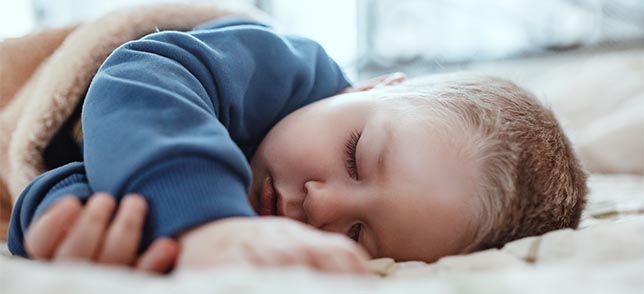
Sleep hygiene tips - daily habits
1. Keep a consistent sleep schedule
Consistently going to bed at the same time each night and waking up at the same time every morning helps realign your circadian rhythm. You can also create a sleep hygiene routine that begins one hour before bed to gently unwind and relax – all of which will improve your ability to sleep.
2. Turn off electronic devices before you go to sleep
Turn off your mobile, tablet, and TV around one hour before bedtime. Technological devices emit blue light which can disrupt your circadian rhythm*11 and affect the production of melatonin, a hormone which induces sleep. Devices also provide too much mental stimulation when you should be relaxing.
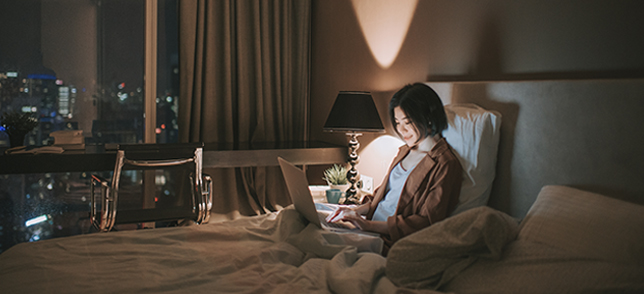
3. Exercise regularly
Exercise is proven to be an important part of a healthy life, including being able to sleep well. Exercising during the day can make you feel more tired at night, which will make it easier for you to get to sleep. Don’t exercise at night though. This will energise you and could disrupt your sleep.*12
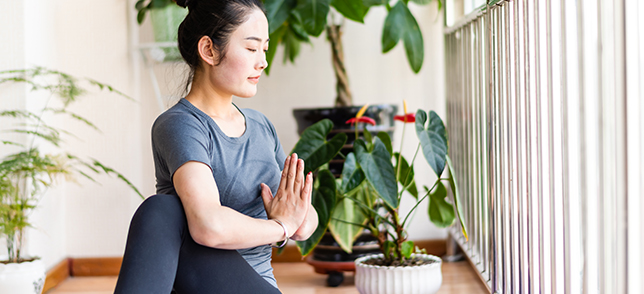
4. Limit your caffeine intake
Don’t worry, you don’t have to skip that morning cup of coffee. It’s OK to have caffeine in the morning, but try to avoid it in the late afternoon and evening. Otherwise it will make it harder for you to get to sleep.*13
5. Use your bed only for sleep
Train your mind to associate being in bed with being asleep. Avoid watching TV, working, eating, or even reading when in bed to establish that link. While reading can help you feel tired, it’s better to do it out of your bed.*14 And if you’re struggling to sleep, don’t lie in bed as this will disrupt the mental link between being in bed and sleeping. Get up and do some gentle, relaxing activities to unwind until you feel tired again. Then get back in bed.*15
6. Limit napping — or avoid it if you can
Napping too much during the day means you won’t be tired enough to sleep at night. If you do want to energise yourself with a quick nap, do it before 3pm and don’t nap for more than 30 minutes. Any more than that will leave you feeling groggy.*16
7. Don’t eat late in the evening
Eating a heavy meal before bed will make it more difficult to fall asleep and to get good quality rest. Your body will still be active while digesting the meal. If you do want to have a snack before bed, make it a light one.*17*18
*11 https://www.cdc.gov/niosh/emres/longhourstraining/color.html
*12 https://thesleepdoctor.com/sleep-hygiene/
*13 https://thesleepdoctor.com/sleep-hygiene/
*14 https://www.myisense.com/blogs/blog/why-your-bed-should-only-be-for-sleeping
*15 https://www.sleepfoundation.org/sleep-hygiene
*16 https://pubmed.ncbi.nlm.nih.gov/21075238/
*17 https://thesleepdoctor.com/sleep-hygiene/
*18 https://www.sleepfoundation.org/sleep-hygiene
Sleep hygiene tips - optimise your bedroom
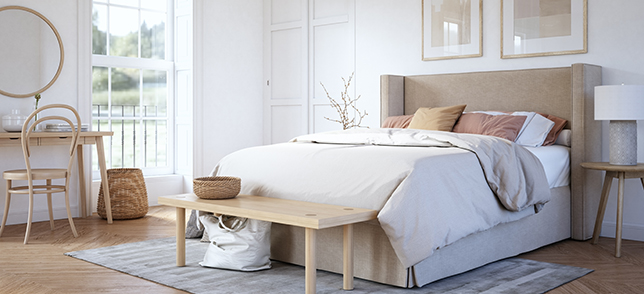
When you start to sleep, your body lowers its core temperature. That’s why a cool bedroom is an essential part of a sleep-conducive environment. The ideal room temperature for sleep is around 18.3°C (65°F).*19
> The key to comfortable living: perfect room temperature and humidity
> How to optimise temperature and humidity in your home
2. Silence for good sleep
Environmental noise, like traffic, can have such an impact on your quality of sleep that you’ll feel the effects the next day. Moodiness and tiredness are just some of what you’ll experience. Ensuring your bedroom environment is completely silent will give you a deeper rest. On the other hand, it can help to introduce some form of white noise in the background. It really depends on your preference.*20
3. Bedding for good sleep
You can’t completely relax unless you’re comfortable. And good bedding will help with that. Choose bedding that feels good to you, and wear light, breathable pyjamas. Changing into pyjamas as you go to bed will also train your mind to start feeling tired whenever you put them on.*21*22
4. Air quality for good sleep
Sleeping in a room with polluted air is known to affect sleep quality.*23 We’ve already mentioned how temperature can affect sleep. That’s one important aspect of air quality. Other aspects include: humidity, cleanliness, airflow, sterilisation, deodorisation, and fragrance. The right combination of these creates the perfect conditions for good air quality that contributes to a restful environment.
*19 https://www.healthline.com/health/sleep/best-temperature-to-sleep
*20 https://www.sleepfoundation.org/noise-and-sleep
*21 https://panasonic.jp/aircon/air_letter/sleep.html
*22 https://www.sleepfoundation.org/sleep-hygiene
*23 https://www.ncbi.nlm.nih.gov/pmc/articles/PMC7877449/
Sleep well with nanoe™ X
But how do you ensure that your bedroom has good air quality? nanoe™ X technology takes care of the different aspects of air quality. nanoe™ X uses naturally occurring molecules called hydroxyl radicals, which are encased in water particles. These eliminate bad odours, inhibit allergens as well as pollen, break down hazardous pollutants in the air, and combine with sebum to moisturise your skin and hair. The technology is made from water particles so it’s safe for everyone, including babies. What’s more is that this technology works 24 hours a day, so you can rest assured that you always have the highest quality air for the highest quality rest. Combining this with the other tips for better sleep hygiene will give you the best chance of a good sleep. Sleep well.
